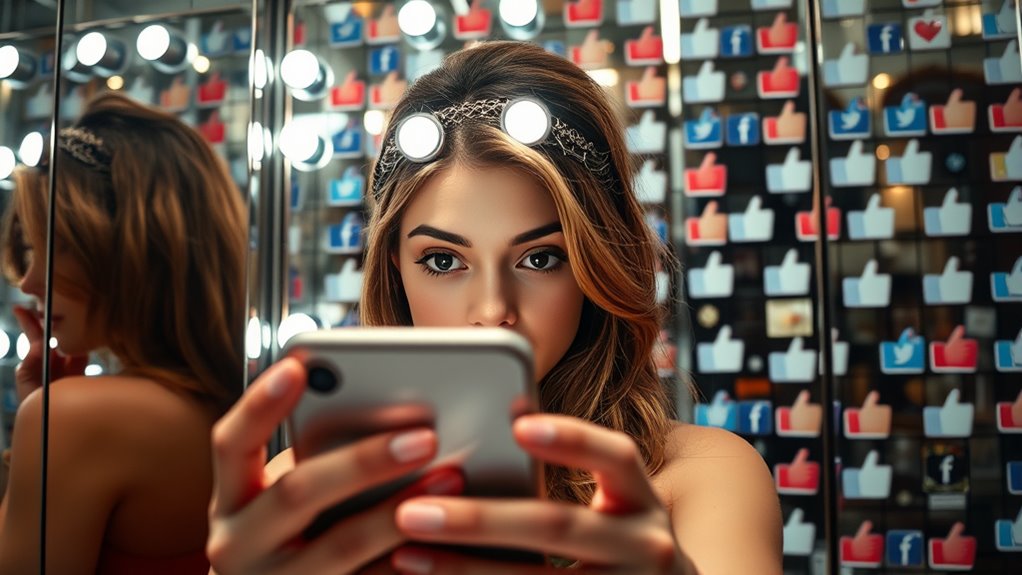Social media fuels narcissistic behaviors by emphasizing appearance, validation, and self-promotion, which can amplify tendencies like self-obsession and entitlement. Platforms’ features, like likes and filters, reinforce a focus on appearances and social approval, often leading to low self-esteem, anxiety, and emotional distress. If you keep exploring, you’ll discover how these online environments shape self-image and what strategies can help protect your mental health.
Key Takeaways
- Social media amplifies narcissistic tendencies through validation-driven features like likes, comments, and follower counts.
- Curated self-presentation fosters unrealistic standards, increasing insecurity and mental health issues.
- Narcissistic behaviors online can lead to heightened anxiety, low self-esteem, and emotional distress.
- Platforms promote constant self-display and comparison, reinforcing narcissism and social validation dependence.
- Overreliance on online validation may exacerbate narcissistic traits and contribute to problematic psychological cycles.
The Link Between Narcissistic Traits and Social Media Engagement

Research shows a clear connection between narcissistic traits and how people engage with social media. If you have grandiose narcissism, you’ll likely post more selfies and status updates to attract admiration. Platforms like Instagram and Twitter amplify this, especially when users seek feedback and validation. Additionally, the desire for social validation can be reinforced by the use of multi-functional furniture, which allows users to showcase themselves and their possessions in a versatile way. Social media can reinforce narcissistic tendencies by providing constant opportunities for self-promotion and attention-seeking. The asynchronous nature of these platforms often encourages self-focused behavior, reducing empathy and fostering a cycle of self-promotion. Moreover, the visual-centric design of many social media platforms emphasizes appearance and presentation, further fueling narcissistic behaviors. This focus can be linked to the way personality traits influence online behavior and self-perception. Cultural differences and platform-specific features also influence how narcissism manifests online, shaping your online behaviors and self-perception. Furthermore, the use of AI-driven analytics can contribute to understanding and potentially manipulating these online behaviors for personal or commercial gain, especially when tailored to individual tire pressure and other preferences.
Different Forms of Narcissism and Their Online Behaviors

Different forms of narcissism manifest uniquely online, influencing how you present yourself and seek validation. Grandiose narcissists often post assertively, craving admiration to boost their self-image, while vulnerable narcissists tend to be more reserved but constantly seek reassurance through positive feedback. Self-promotion techniques are commonly used by grandiose types to enhance their online status and attract followers. Some narcissists also display traits of emotional needs, which drive their online interactions and validation-seeking behaviors. These needs can be amplified by social media algorithms, which tend to favor engaging, attention-grabbing content, further fueling narcissistic tendencies. Sexual narcissists might use social media for seductive or attention-seeking behaviors, and hypervigilant types experience heightened threat detection, making interactions stressful. Online, grandiose narcissists exploit platforms like TikTok and Facebook to reinforce their self-importance through self-promotion, selfies, and updates. Vulnerable narcissists, on the other hand, rely on online validation to counteract feelings of inadequacy and hypersensitivity. Additionally, AI vulnerabilities can sometimes be exploited by narcissistic individuals to manipulate perceptions or amplify their online personas. These behaviors can lead to addictive tendencies, especially in those with narcissistic traits, amplifying their online presence and sometimes fueling further narcissism. Personality traits also influence how individuals engage with social media, shaping their online personas and interactions.
Psychological Consequences of Narcissism Amplified by Social Platforms

Social media amplifies the psychological effects of narcissism by providing constant opportunities for validation and self-promotion. When you post frequently or have a large following, you may notice increased narcissistic tendencies. Platforms like Instagram and Facebook, which focus on visual content, encourage self-presentation, often fueling feelings of insecurity and anxiety. Narcissistic traits—whether grandiose or vulnerable—are linked to higher anxiety levels, which social media can intensify through social comparison and unrealistic standards. The curated images and idealized personas can cause feelings of inadequacy and low self-esteem. Additionally, the instant gratification from likes and comments reinforces narcissistic behaviors, making it harder to escape the cycle of seeking external validation. Furthermore, the self-presentation aspect of social media encourages individuals to craft and maintain a facade that may not reflect their true selves, leading to increased psychological distress. The constant exposure to idealized images can distort perceptions of reality, further exacerbating feelings of inadequacy. Ultimately, this cycle worsens mental health issues like anxiety and depression.
How Social Media Shapes Societal Views on Self-Image

Social media dramatically influences how society views self-image by constantly exposing you to curated and idealized portrayals of beauty and success. These images set unrealistic standards that many feel pressured to meet, often leading to feelings of inadequacy.
Social media shapes self-image through curated, idealized portrayals that create unrealistic standards and feelings of inadequacy.
The culture of comparison intensifies as you evaluate your worth against polished profiles, fostering dissatisfaction with your own appearance and achievements. Cyberbullying and negative feedback loops can further damage your self-esteem, making you seek validation through likes and comments.
Online interactions help shape your digital identity but also create anxiety about judgment and acceptance. For youth especially, social media’s influence is powerful, impacting how they see themselves and their place in society. Establishing healthy boundaries and awareness of media literacy can help mitigate some of these negative effects. Additionally, the cybersecurity vulnerabilities associated with social media platforms can expose users to privacy breaches and malicious attacks, further complicating the impact on self-image. Recognizing the importance of color accuracy and other visual standards can also help users develop a more realistic perspective on appearance and success, reducing the negative impact of idealized images. Furthermore, understanding filter use and editing trends can enhance awareness of manipulated images, fostering a more critical view of online content. Incorporating self-awareness practices can also empower individuals to recognize their own biases and emotional responses to social media, promoting healthier engagement.
Ultimately, these pressures distort self-image, affecting mental health and self-worth.
Technological Features That Fuel Narcissistic Tendencies

Technological features on social media platforms actively promote narcissistic tendencies by rewarding self-promotion and validation. Likes and comments serve as immediate rewards, releasing dopamine and encouraging you to seek more approval. Nail tips and other beauty-related content often showcase curated images, reinforcing idealized self-images. Profile customization allows you to craft an idealized self-image, boosting feelings of grandeur. Sharing photos and videos, especially selfies, amplifies your attractiveness and confidence, often with filters or edits to perfect your appearance. Follower counts act as status symbols, enhancing your sense of importance. Algorithmic feedback pushes you to post content that garners high engagement, reinforcing the cycle. Reaction options and comment sections give direct validation, fueling your need for admiration. Features like live streams and ranking badges further elevate your social standing, making validation feel constant and addictive. Additionally, social media engagement metrics are designed to increase user interaction, further fueling narcissistic behaviors. The emphasis on visual content encourages constant self-display and comparison, deepening narcissistic tendencies. Moreover, the integration of aesthetic elements such as home decor and personalized profiles can contribute to an individual’s self-image enhancement and social validation. Creating an environment that emphasizes appearance and status can lead to increased narcissistic traits among users.
Exploring Future Directions for Research and Intervention

To better address the influence of narcissism on social media, future research should prioritize longitudinal studies that track changes in personality traits over time. This approach will reveal how social media use impacts narcissistic tendencies across different demographics and platforms. Additionally, incorporating behavioral indicators like selfie posting and follower counts can provide more nuanced insights into online narcissism, especially when combined with assessments from tools like the NPI. Furthermore, exploring how cultural and platform-specific factors moderate these relationships will deepen understanding. Intervention strategies could include mindfulness practices, digital behavior modification, and self-regulation tools designed to help users manage their online behavior. Developing tailored educational programs and examining peer and parental influences will also be *essential*. For instance, understanding how exfoliation benefits influence skin health can inform comprehensive skincare approaches. Recognizing the importance of skincare ingredients, such as glycolic acid, and their effects on skin texture and appearance can enhance personalized treatment plans. Integrating findings from behavioral psychology can further improve intervention efficacy and user engagement. These efforts will help create targeted interventions to mitigate social media’s potential to exacerbate narcissistic traits and improve mental health outcomes.
Frequently Asked Questions
Can Social Media Use Cause Narcissism or Just Reflect Existing Traits?
You wonder if social media causes narcissism or just shows what’s already there. Research suggests it can do both.
When you post selfies and seek likes, it may boost narcissistic traits over time. But if you already have narcissistic tendencies, social media reflects and amplifies them through feedback like comments.
How Do Different Social Media Platforms Uniquely Influence Narcissistic Behaviors?
You might think social media simply reflects your personality, but it actually shapes your behavior differently depending on the platform.
Facebook fosters validation and connection, boosting narcissistic tendencies through positive feedback.
Instagram emphasizes appearance, fueling vanity.
Twitter’s real-time updates can lead to addiction, while TikTok’s short videos encourage instant gratification.
Each platform uniquely amplifies certain narcissistic traits, influencing how you seek admiration and interact with others online.
Are There Effective Strategies to Reduce Narcissistic Tendencies Promoted by Social Media?
You can reduce narcissistic tendencies by practicing self-compassion and embracing authenticity online. Limit your social media use, set boundaries, and focus more on face-to-face interactions and real-life friendships.
Avoid comparing yourself to others and recognize narcissistic behaviors early. Blocking or distancing yourself from narcissistic content and individuals also helps.
What Role Does Culture Play in the Relationship Between Social Media and Narcissism?
When it comes to the relationship between social media and narcissism, culture plays a big part—it’s the wind in your sails. In individualistic societies, you’re more likely to seek validation and self-promotion, fueling narcissistic behaviors.
Conversely, collectivist cultures emphasize harmony, which can curb these tendencies. Your cultural norms shape how you share, seek feedback, and connect online, ultimately influencing how narcissism manifests across different regions.
How Might Social Media Algorithms Be Redesigned to Minimize Narcissistic Reinforcement?
You can help minimize narcissistic reinforcement by advocating for algorithm redesigns that prioritize content quality over engagement metrics. Platforms should promote diverse perspectives and limit echo chambers, encouraging critical thinking.
Implementing tools that foster emotional regulation and social impact feedback can also reduce impulsive, attention-seeking behaviors. By supporting features that reward meaningful interactions and offline engagement, you contribute to healthier online environments, curbing narcissistic tendencies.
Conclusion
Like a mirror in a funhouse, social media reflects and distorts your self-image, amplifying narcissistic tendencies. If you’re not careful, this digital hall of mirrors can trap you in endless cycles of validation and comparison. But remember, you hold the key to stepping out of this labyrinth. By recognizing the illusions and choosing authenticity over illusion, you can turn the mirror into a window—a clear view of who you truly are beyond the surface.











